Driving With Dogs Can Cause £1,816 in Damage
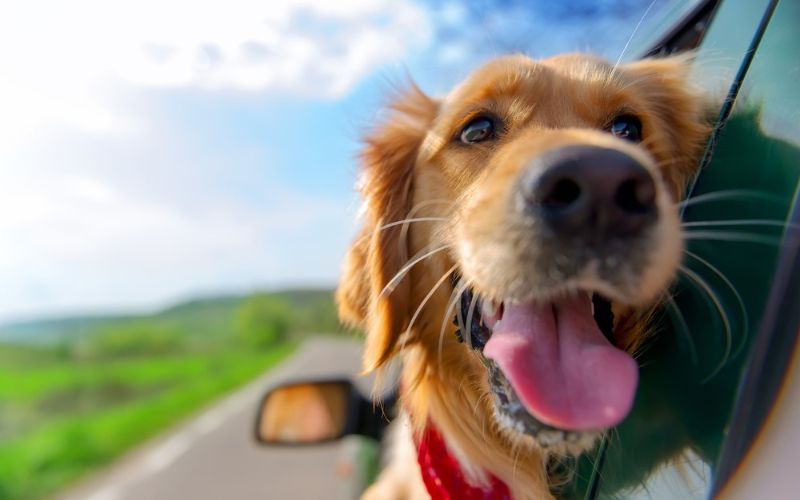
With 12.5 million pet dogs in the UK, your pet has a big input in your life and the decisions you make.
Considering your pooch in your next big decision has become the norm. One such choice is the car you buy – not only for the safety of your pet but also the lifespan of the car itself.
Damage made by pets to your vehicle can be expensive to fix - even wear and tear - and can also be inconvenient to deal with. Let’s take a look at what travelling with your pet could cost you and some tips on how to prevent it.
Are you prepared for up to £1,816 in car repairs?
Our furry friends get away with a lot, because we love them. However, the damage our pets can inflict on our vehicles can affect resale value, repair costs and cleaning bills – these all add up!
We calculated it could be as much as £1,816 over your pet’s lifetime. This could eat into any resale profit, should you want to sell.
Not only damage costs, but should your beloved pooch distract you at the wheel, you could face a fine of up to £5,000. Accidents where your pooch is not safely secured in the vehicle can also invalidate your insurance claim.
Up to £80 per exterior scratch to repair
Everyone gets excited for walkies - it’s understandable! If your pooch is less than poised when getting into your car for their outdoor adventure, it may lead to light scratching on your car’s exterior paintwork.
Although wear and tear is to be expected from a pet owner’s car, it could be the first thing your potential buyers see. Repairing light scratches will cost around £80 per scratch, and if you have more than one, a full panel respray could be up to £400.
Prevention is always better than a cure. To limit your excitable pup’s chances of leaving its mark in your paintwork, keep a short leash until you’ve opened the door to let them in.
Up to £90 to repair scratched or torn upholstery
Once they are seated in the car, your dog’s claws can inflict a lot of damage, accidentally or intentionally. If your pooch feels unsteady in the car, it will tend to dig claws in to keep itself steady.
There are accessories available that can help with this. A dog seat belt or harness, perhaps a back seat dog bed would be ideal to secure your pawfect pal. For more accessories to help with keeping your favourite furry friend safe in the car, check out our safety tips article.
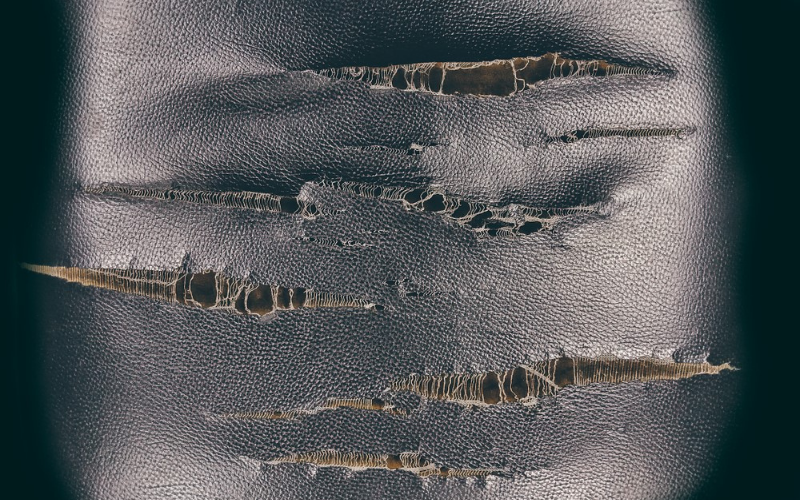
£325 per seat to save upholstery from little accidents
Accidents happen! Especially if your pet is new to the routine, a nervous traveller or not fully toilet trained. Both urine and vomit are very tricky to clean from a car interior, especially while out and about.
If you can’t clear up quickly, your upholstery may be beyond your own repair. A cool £325 per seat is what you’ll be expected to pay to reupholster a fabric seat. Should you need to reupholster leather it will be significantly more.
Again, there are plenty of accessories to help with this, including the dog hammocks and seat covers, to more easily protect your upholstery from potential accidents.
Over £416 for nibbles from peckish pooches
Chew toys are available for a reason – most pets at some point enjoy a good chew! But don’t let that moment be on your car’s furnishings.
Chew marks on seats, soft plastics or your cabin equipment can add up. A gear knob can cost up to £55 to replace. A steering wheel repair could be around £80 and a full recovery of a steering wheel is around £130, depending on material and style.
Away from cosmetics, and more towards function, if your dog chews through your seatbelts or damages your buckle, you could expect around £151 in essential repairs.
There are plenty of accessories available for boisterous doggos, to keep them safe and secure and out of nibbling reach of essential equipment.
Even a dirty mat can set you back £20
If left unattended, dirt can build up on the floor of your car, specifically on the floor mats, which in worst case situations can lead to irreversible damage.
Replacing mats would cost around £20 for basic style. Should you need to replace your carpet, the costs will rocket up into the hundreds.
Regular cleaning is the ideal way to prevent a buildup of hair, muck and debris. Whether you run a vacuum cleaner over your interior or send it for a thorough valet, it all will help keep your car in tip top, usable condition.
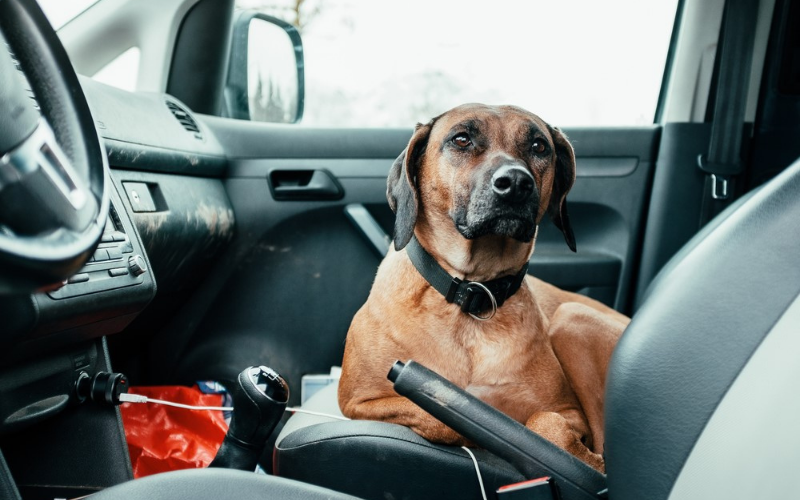
Wouldn’t you prefer to spend just £116.50 rather than £1,816?
As we can see from the list above, our pets can cause a great deal of damage. But we love them.
We have put together a list of precautions you can take that will save you hundreds of pounds in repairs and accidents, so you can enjoy time with your perfect pooch without the worry.
Your shopping list for pet adventures:
- Front and rear seat covers, £40
- Pet seat belt, £5
- Dog drying coat, £15
- Regular valets, £56.50
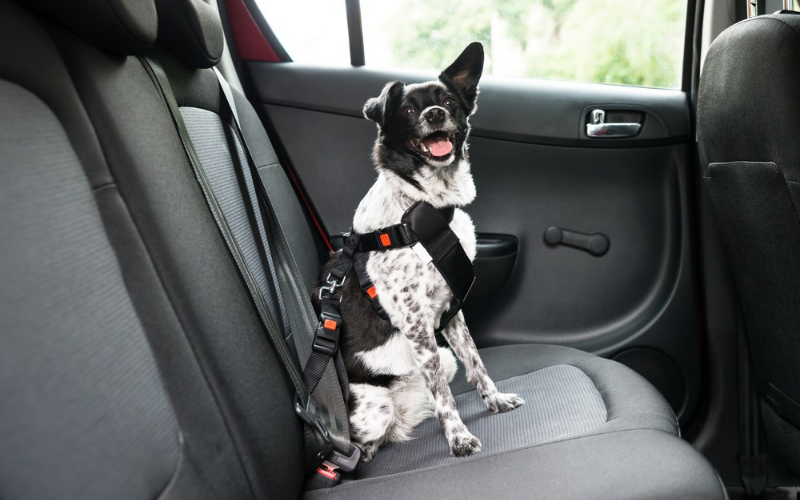
Signs your dog may have travel anxiety
Anxiety isn’t just for humans. Our pets can feel anxious for many reasons.
Travel anxiety is a common reason. Experiencing the unfamiliar, without the freedom to remove themselves from the situation can be stressful. To help you to spot the signs, Animal Behaviourist from Ruffle Snuffle, Sarah-Jane White, explains what to look for:
“One of the most common signs of travel-related distress in pets is panting. Panting is a normal behaviour for dogs, but it can be a sign of stress or anxiety in some cases. If your dog is panting excessively, it’s important to take a break and give them a chance to calm down.”
- Panting
Although this a normal behaviour too, it’s worth looking for excessive panting throughout the journey to indicate how your dog is feeling.
- Whining
A common expression of distress in dogs and it is no different when in a vehicle.
- Barking
Barking, particularly when non-stop is your dog’s way of saying “I’m worried”.
- Pacing
Unsettled behaviour like walking from side to side in their crate can be a clear sign.
- Trying to escape from the vehicle
Digging at the upholstery and lunging for doors and windows can show the pooch simply wants to leave.
“Previous journeys that have resulted in pain or an unpleasant experience for the dog can heighten a pet’s travel anxiety. The common triggers are a trip to the vets or the groomers.
Try to avoid these trigger factors by taking your pet for shorter journeys in the car where they get to go and play at the destination.”
Steps to familiarise your dog with car travel
We asked Blue Cross for their recommendations on how to familiarise your dog with your car before you set off on your adventure.
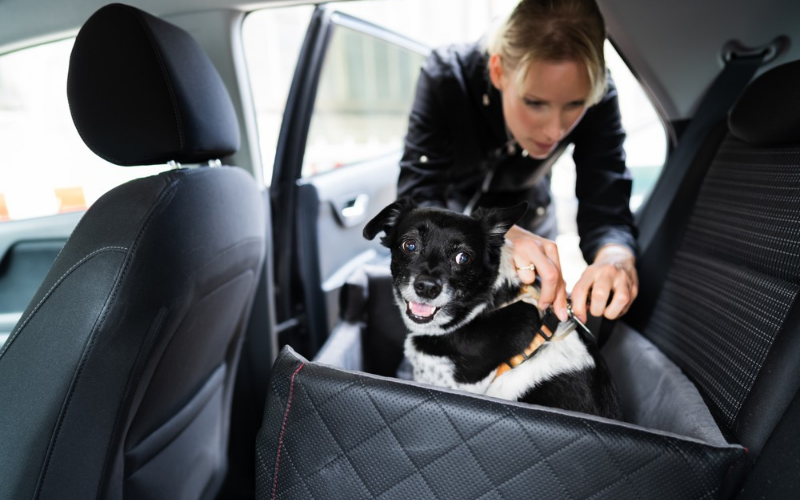
Step-by-step: How to acquaint your dog with the car
1. Walk your dog by the car
Start off by walking your pooch around the vehicle. Leave the engine off and avoid any fumes from the rear of the car. Reward calm behaviour with treats and positive reinforcement.
2. Let them sit in the car
Once happy with the exterior, make a comfortable inside space for them inside. If you have any accessories to keep your dog happy and safe, introduce those too.
3. Take a short journey in the car
To ease your dog into the movement of the car, take a short trip out - no more than 15 minutes.
4. Slowly build up your journey times
By building up journey times, your dog will get used to the car in a gradual way.
With every calm excursion experience and with good behaviour being positively reinforced, your dog will be happy, safe and secure for every adventure you take together. Check out our shortlist for the top contenders for your next pup-friendly car, some detailing the best interior spaces with easy clean and durable materials.
Happy exploring!
Methodology
We calculated the total value of damage caused by pets by using the average costs for common pet-related repairs. The total figure of £1,816 was based on:
- Replacing car mats (£20)
- Reupholstering four chairs in fabric (£325 each)
- Repairing scratched or ripped upholstery e.g., armrests (£80)
- Replacing a gear knob (£55)
- Recovering a steering wheel (£130)
- Replacing a seat belt (£151.47)
- Repairing a light exterior scratch (£80)
Average selling prices were also used to calculate the total cost of items that can prevent pet-related damage.